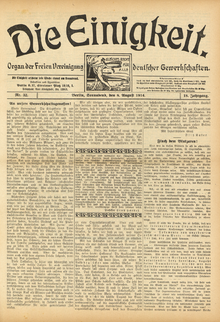
Die Einigkeit
Encyclopedia

Free Association of German Trade Unions
The Free Association of German Trade Unions was a trade union federation in Imperial and early Weimar Germany. It was founded in 1897 in Halle under the name Representatives' Centralization of Germany as the national umbrella organization of the localist current of the German labor movement...
(FVdG). Its original editor was Gustav Kessler
Gustav Kessler
Gustav Kessler was a German trade unionist.He joined the Progress Party in 1883 and was the editor of Bauhandwerker, a construction workers' unionist magazine from 1884 to 1886. As a result of the Anti-Socialist Laws, he was expelled from Berlin in 1886 and eventually from other towns as well...
, but he was replaced by Fritz Kater
Fritz Kater
Fritz Kater was a German trade unionist active in the Free Association of German Trade Unions and its successor organization, the Free Workers' Union of Germany...
after his death in 1904.
The FVdG's founding congress in Halle
Halle, Saxony-Anhalt
Halle is the largest city in the German state of Saxony-Anhalt. It is also called Halle an der Saale in order to distinguish it from the town of Halle in North Rhine-Westphalia...
in 1897 decided to publish a newspaper fortnightly under the name Solidarität (Solidarity). Some trade unions in the federation required their members to subscribe to Einigkeit, while most did not. A year later the title was changed to Die Einigkeit. Organ der lokalorganisierten und durch Vertrauensmänner zentralisierten Gewerkschaften Deutschlands, which was changed to Einigkeit. Organ der Freien Vereinigung deutscher Gewerkschaften in 1901, the year the federation was renamed to Free Association of German Trade Unions. On April 1, 1898 the newspaper started being published on a weekly basis. In 1897, the newspaper had a circulation
Newspaper circulation
A newspaper's circulation is the number of copies it distributes on an average day. Circulation is one of the principal factors used to set advertising rates. Circulation is not always the same as copies sold, often called paid circulation, since some newspapers are distributed without cost to the...
of 2,650, a number, which steadily increased, reaching over 10,000 in 1900, and a peak circulation of over 13,500 in 1906. A loss of members of the FVdG decreased Die Einigkeits popularity after that.
In 1911, the FVdG started publishing a second weekly newspaper, Der Pionier
Der Pionier
Der Pionier was one of two official organs of the radical socialist Free Association of German Trade Unions .With its founding in 1897, the FVdG also started the newspaper Einigkeit as its official organ...
, which had a circulation of 4,500 in 1912.
During World War I, both Die Einigkeit and Der Pionier were banned by the German authorities.

